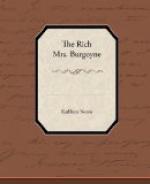Nearby were the one or two big dry-goods stores, with lovely gowns in their windows, and milliners’ shops, with French hats in their smart Paris boxes—there was even a very tiny, very elegant little shop where pastes and powders and shampooing were the attraction; a shop that had a French name “et Cie” over the door.
In short, there were modern women, and rich women, in Santa Paloma, as these things unmistakably indicated. Where sixty years ago there had been but a lonely outpost on a Spanish sheep-ranch, and where thirty years after that there was only a “general store” at a crossroads, now every luxury in the world might be had for the asking.
All this part of the town lay northeast of the sleepy little Lobos River, which cut Santa Paloma in two. It was a pretty river, a boiling yellow torrent in winter, but low enough in the summer-time for the children to wade across the shallows, and shaded all along its course by overhanging maples, and willows, and oaktrees, and an undergrowth of wild currant and hazel bushes and blackberry vines. Across the river was Old Paloma, where dust from the cannery chimneys and soot from the railway sheds powdered an ugly shabby settlement of shanties and cheap lodging-houses. Old Paloma was peppered thick with saloons, and flavored by them, and by the odor of frying grease, and by an ashy waste known as the “dump.” Over all other odors lay the sweet, cloying smell of crushed grapes from the winery and the pungent odor from the tannery of White & Company. The men, and boys, and girls of the settlement all worked in one or another of these places, and the women gossiped in their untidy doorways. Above the Carew house and Doctor Brown’s, opposite, River Street came perforce to an end, for it was crossed at this point by an old-fashioned wooden fence of slender, rounded pickets. In the middle of the fence was a wide carriage gate, with a smaller gate for foot passengers at each side, and beyond it the shabby, neglected garden and the tangle of pepper, and eucalyptus, and weeping willow trees that half hid the old Holly mansion. Once this had been the great house of the village, but now it was empty and forlorn. Captain Holly had been dead for five or six years, and the last of the sons and daughters had gone away into the world. The house, furnished just as they had left it, was




